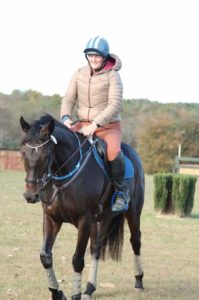
For as long as I can remember I have loved horses. They are in my blood courtesy of my maternal family, so it isn’t a surprise that after my first lesson at age 4, I would do anything to ride. Unfortunately, we lived on a boat. My parents were avid sailors and built a 45′ sailboat to circumnavigate the world. My first pony, “Finally”, was a $60/month lease. . . IF I could catch him. At 4 I had to learn to think like a Pony. Finally had an affinity to grass and dumped me on a regular basis. I competed him in gymkana, trail, English, western. . . If it was open to a child and half wild pony, I was in it! By age 6 I was racing him bareback at the fairgrounds track when no one was watching. My favorite book was “The Girl Who Loved wild Horses”, by Tom Goble. I dreamt that if I spent enough time with the horses, I could become one.
Eventually I outgrew Finally and my parents bought me a 5 year old Arabian mare named Miya. I was 7. It was a terrible idea, but we didn’t have a lot of money and it seemed logical to have me paired with something that I could “grow up” with. [Insert “don’t try this at home message here.] Miya taught me a lot and looking back, I wish I had the knowledge now that I lacked then. We joined 4-H and did literally ALL the things. I built my own jumps, rode everywhere in a halter and lead, tried my hand at teaching her to go bridleless. . . I went from being afraid of the semi-feral broodmare to winning everything. Our partnership lasted for 4 years before my father bought me my first Thoroughbred by Bold Ruler. This was a turning point in my life.
For my 11th birthday my Dad, Steve, bought me a book by Hillary Clayton on conditioning the event horse, a stud kit, over girth, and heart rate monitor (before they were cool). It was 1992 and I had dreams of being a Grand Prix show jumper and representing the US in the Olympics. My aunt took me to Gladstone to watch the Olympic trials. Norman Dello Joio and Irish were my favorite. I didn’t want to event, but Dad had other plans. It was later that year I competed in my first horse trial. No, things didn’t go well, but I was hooked.
What followed was a series of throw away horses that either threw people, ran away, or were deemed “useless” for one reason or another. These horses occurred at the same time I discovered Pony Club, which may have saved my life AND set me on the path I’m on today as an advocate not just for me, but for my horses. My father took over as course designer and builder of our Pony Club Horse Trials that ran recognized through training. It was those hot summer days that I was introduced to how important officials are to our sport and lit a fire that one day, I would join them in keeping a safe and level playing field for our sport.
Fast forward 10 years. I graduated from Western Washington University with a Bachelor’s in Political Science and minor in Psychology. I met my [now] husband and he offered me a wedding ring or second horse. I wound up with a Storm Cat grandson who changed my life. “Cantilator” was feral and wild- even after racing for 2 years. He forced me to expand my comfort zone of education and think outside the box, because he was determined to LIVE outside the box. From Washington state to California, and eventually Aiken, SC, Tilly became a successful Intermediate horse, opening the door for his full sibling to join us and unbeknownst to me at the time, making my dream of becoming a licensed official a reality.
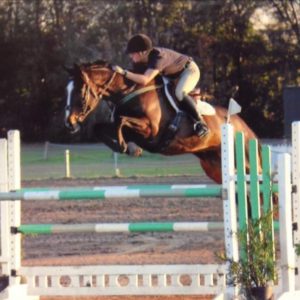
In 2013, I acquired my ‘r’ Technical Delegate license through USEF. Unfortunately neither Tilly nor my father were alive to see the culmination of years of work. My father had passed in 2011 and Tilly joined him just 9 months later at the age of 9. I continued to ride difficult horses. Some I bought from sketchy auctions or feedlots, while others were once again deemed “useless”. Every single horse found a purpose. . . And most became successful event horses.
Throughout my life I have run. I was the “fat kid” and to this day relate to a story about a child who ran away from “Plumpkin”, their childhood nickname. They became a Boston Qualifying marathoner and semi-elite athlete, but always ran from Plumpkin. While I ran, I also love food. At 19 I ran my first marathon. Similar to my first horse trials, it was an epic disaster, but misery loves company and I was HOOKED! I raced in triathlons through 70.3/ half Ironman distance, Ultra marathons of 50k-100k, and found my place pacing people to their first finishes in marathons.
July 14, 2019 life changed forever. While visiting my husband deployed to Germany, we took a family trip to Berlin. We rode bikes to see the Wall and were headed back for lunch at Marine Platz. There were trolley tracks and I knew I needed to stop before negotiating them. My timing was off by a second and before I could do anything, I was flying through the air to the middle of the street. Two women jumped up from a table at a Cafe across the street and ran to help me. As they pulled me to my feet, I placed my left foot on the ground and my foot detached from my body. A closed, committed, displaced fracture. I learned later this is the worst type of fracture. 2 weeks and 2 surgeries in Charíte hospital and I was pieced back together with hope of a full recovery.
While walking cross country at the Virginia Horse Trials CCI at the end of October, I was stuck in a lightning storm. I couldn’t run from pain in my ankle. I couldn’t get to safety. Something was very wrong. So began the next 18 months of seeing the best specialists in the US, including psychiatrists, in a hope for answers and eventually to have my leg amputated. It also started my quest to return to school for a Masters in Orthotics and Prosthetics.
As COVID shut the world down, I returned to school- at age 39- to begin prerequisites. Classes included statistics, chemistry, geometry, algebra, physics, more psychology, and all the anatomy and physiology one can stomach. (Pun intended) I managed to keep straight A’s, even through surgery to amputate my left leg below the knee in February 2021. I only missed one day of class- the day after surgery.
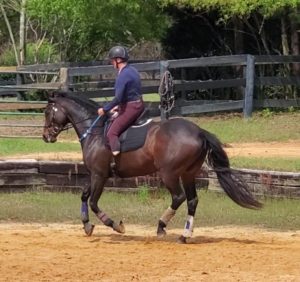
With COVID in full swing, finding any practitioners to shadow and intern was next to impossible. One day I heard a podcast with Josh Southard, Director of Amputee Blade Runners (ABR). It was September 2020 and I was desperately trying to find people who had made the choice to amputate due to trauma as well as talk to people who rode and ran after losing their leg. ABR was founded in Nashville, TN by two proathetists- one who is an amputee, paralympic gold medalist and WR holder in track events. He attributes his life and opportunities to the blade he was given, so the organization was born to give the gift of running to others. I emailed ABR on a whim and received a phone call from Josh two days later, asking how close I was to Savannah, GA and would I drive down to meet with the paralympic medalist and co-founder. I spent the next few weeks full of more hope than I had in over a year!
Ryan Fann walked into the room with a warm smile and the presence of an Olympian. We chatted for a while, went to lunch, then I asked if I could stay and shadow him. He kindly allowed me to, so at the end of the day, I asked if I could come back and again he said yes. Every day for the next months and now almost 2 years, I have kept going back. The 2.5 hour drive each way is worth it for the patients I meet, the skills I have learned, and the family I have gained through Ryan. I have completed all the tasks needed to apply for a blade from Amputee Blade Runners, but my biological leg has taken a beating from overuse. I was told it was the worst ankle arthritis the orthopedist has ever seen. I may not be able to join the ABR family as an athlete, but they have given me my life back and I’m proud to represent the little known/unknown work they do with riders through their co-founder, Ryan Fann, at Reform Prosthetics in Savannah, GA.
So where is life now? Having completed all prerequisites in May 2021, I took the GRE in October, applied to Masters programs, and even had a CHOICE of which program I wanted to attend! The standout was California State University in Dominguez Hills- between Long Beach and LA. Classes have already begun and I will leave my family in Aiken, SC, my precious horse, Lucy, with Jessica Schultz at Fairplay Farm to continue her education, and I’m headed West to make the world a better place. Lucy is my only going horse right now, having just finished our first training level horse trial [back] and 2nd level dressage with qualifying scores for Regionals AND my Bronze medal. I still officiate, but am taking a break while school is super intense.
And so, to anyone struggling with life changes, identity, or disability, I share with you words of wisdom from Marcus Aurelius:
“Think of yourself as dead.
You have lived your life.
Now, take what’s left and live it properly.
What doesn’t transmit light creates its own darkness.”
Your heart knows what is best for your future, even if it isn’t clear to you now. When the universe presents an opportunity, if it makes your heart race with excitement, seize the chance. Don’t be afraid to reach out to strangers you admire for advice. The worst they can do is say no. You have to fight for your life, but I can guarantee you’re worth it. Your bravery lights the way for others to follow and change the world. #thecomebackisgreaterthanthesetback
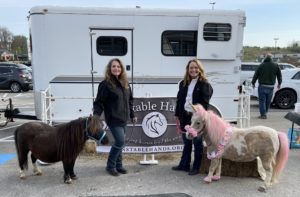 Cari Worley and I (Jen Ely) Grew up with a passion for horses. As young girls, we took riding lessons in an English barn nearby with Cari continuing to compete for the equestrian team in college. As it does for so many, we both got married and had kids, forcing our love for riding to pause outside of the occasional ride through the years.
Cari Worley and I (Jen Ely) Grew up with a passion for horses. As young girls, we took riding lessons in an English barn nearby with Cari continuing to compete for the equestrian team in college. As it does for so many, we both got married and had kids, forcing our love for riding to pause outside of the occasional ride through the years.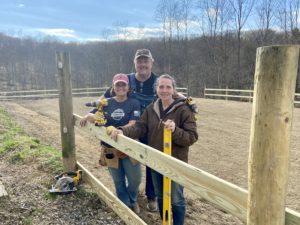 We were asked to bring a horse to VetsPlace, a local organization that offers temporary housing to homeless vets. It was after spending the afternoon watching the interaction between Shadow (the paint pictured) and the vets that Cari and I decided we needed to find a way to share the power of the horse and human bond. We attended an EAGALA (Equine Assisted Growth & Learning Association) certification and founded In Stable Hands. Our primary focus with our nonprofit is providing equine-assisted growth and learning on the farm with also the goal to go mobile in order to reach high risk populations that would not traditionally have the ability to access our program. Since we founded, we have worked with schools, senior centers, veteran organizations, law enforcement, youth organizations, and Easter Seals.
We were asked to bring a horse to VetsPlace, a local organization that offers temporary housing to homeless vets. It was after spending the afternoon watching the interaction between Shadow (the paint pictured) and the vets that Cari and I decided we needed to find a way to share the power of the horse and human bond. We attended an EAGALA (Equine Assisted Growth & Learning Association) certification and founded In Stable Hands. Our primary focus with our nonprofit is providing equine-assisted growth and learning on the farm with also the goal to go mobile in order to reach high risk populations that would not traditionally have the ability to access our program. Since we founded, we have worked with schools, senior centers, veteran organizations, law enforcement, youth organizations, and Easter Seals.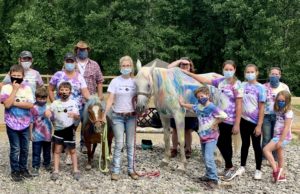
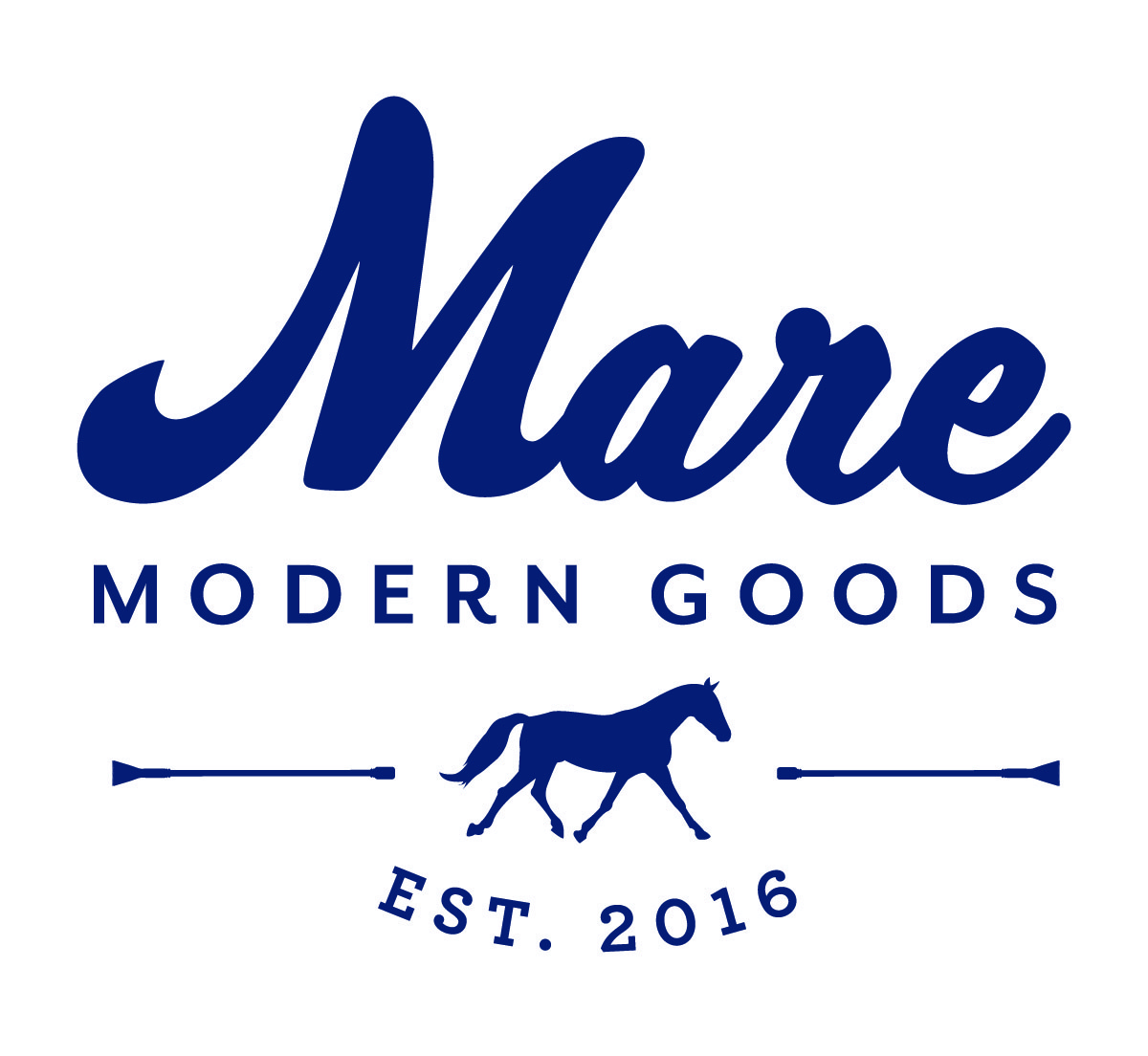
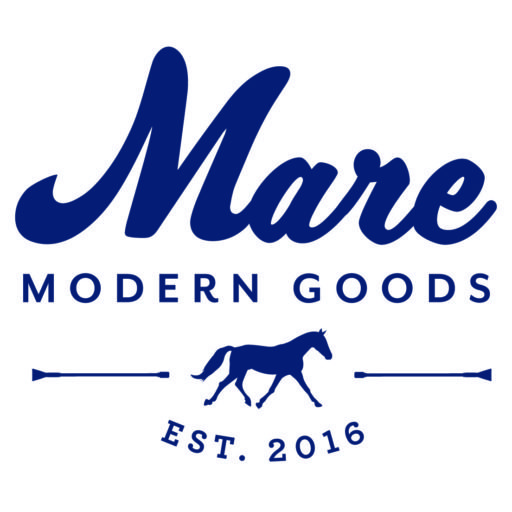

 For as long as I can remember I have loved horses. They are in my blood courtesy of my maternal family, so it isn’t a surprise that after my first lesson at age 4, I would do anything to ride. Unfortunately, we lived on a boat. My parents were avid sailors and built a 45′ sailboat to circumnavigate the world. My first pony, “Finally”, was a $60/month lease. . . IF I could catch him. At 4 I had to learn to think like a Pony. Finally had an affinity to grass and dumped me on a regular basis. I competed him in gymkana, trail, English, western. . . If it was open to a child and half wild pony, I was in it! By age 6 I was racing him bareback at the fairgrounds track when no one was watching. My favorite book was “The Girl Who Loved wild Horses”, by Tom Goble. I dreamt that if I spent enough time with the horses, I could become one.
For as long as I can remember I have loved horses. They are in my blood courtesy of my maternal family, so it isn’t a surprise that after my first lesson at age 4, I would do anything to ride. Unfortunately, we lived on a boat. My parents were avid sailors and built a 45′ sailboat to circumnavigate the world. My first pony, “Finally”, was a $60/month lease. . . IF I could catch him. At 4 I had to learn to think like a Pony. Finally had an affinity to grass and dumped me on a regular basis. I competed him in gymkana, trail, English, western. . . If it was open to a child and half wild pony, I was in it! By age 6 I was racing him bareback at the fairgrounds track when no one was watching. My favorite book was “The Girl Who Loved wild Horses”, by Tom Goble. I dreamt that if I spent enough time with the horses, I could become one. In 2013, I acquired my ‘r’ Technical Delegate license through USEF. Unfortunately neither Tilly nor my father were alive to see the culmination of years of work. My father had passed in 2011 and Tilly joined him just 9 months later at the age of 9. I continued to ride difficult horses. Some I bought from sketchy auctions or feedlots, while others were once again deemed “useless”. Every single horse found a purpose. . . And most became successful event horses.
In 2013, I acquired my ‘r’ Technical Delegate license through USEF. Unfortunately neither Tilly nor my father were alive to see the culmination of years of work. My father had passed in 2011 and Tilly joined him just 9 months later at the age of 9. I continued to ride difficult horses. Some I bought from sketchy auctions or feedlots, while others were once again deemed “useless”. Every single horse found a purpose. . . And most became successful event horses. With COVID in full swing, finding any practitioners to shadow and intern was next to impossible. One day I heard a podcast with Josh Southard, Director of Amputee Blade Runners (ABR). It was September 2020 and I was desperately trying to find people who had made the choice to amputate due to trauma as well as talk to people who rode and ran after losing their leg. ABR was founded in Nashville, TN by two proathetists- one who is an amputee, paralympic gold medalist and WR holder in track events. He attributes his life and opportunities to the blade he was given, so the organization was born to give the gift of running to others. I emailed ABR on a whim and received a phone call from Josh two days later, asking how close I was to Savannah, GA and would I drive down to meet with the paralympic medalist and co-founder. I spent the next few weeks full of more hope than I had in over a year!
With COVID in full swing, finding any practitioners to shadow and intern was next to impossible. One day I heard a podcast with Josh Southard, Director of Amputee Blade Runners (ABR). It was September 2020 and I was desperately trying to find people who had made the choice to amputate due to trauma as well as talk to people who rode and ran after losing their leg. ABR was founded in Nashville, TN by two proathetists- one who is an amputee, paralympic gold medalist and WR holder in track events. He attributes his life and opportunities to the blade he was given, so the organization was born to give the gift of running to others. I emailed ABR on a whim and received a phone call from Josh two days later, asking how close I was to Savannah, GA and would I drive down to meet with the paralympic medalist and co-founder. I spent the next few weeks full of more hope than I had in over a year!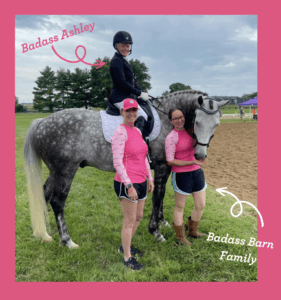 It started with a lump—then a series of appointments, and finally a phone call. On a cold, snowy February 3, 2022, I was diagnosed with stage 2 triple negative breast cancer. The next few days passed in a haze brought on by anxiety and a strange sort of grief. My calendar quickly filled with appointments that replaced runs and rides I had scheduled to prepare for the Horse Capital Half-Marathon and Spring Bay Horse Trials in early April.
It started with a lump—then a series of appointments, and finally a phone call. On a cold, snowy February 3, 2022, I was diagnosed with stage 2 triple negative breast cancer. The next few days passed in a haze brought on by anxiety and a strange sort of grief. My calendar quickly filled with appointments that replaced runs and rides I had scheduled to prepare for the Horse Capital Half-Marathon and Spring Bay Horse Trials in early April.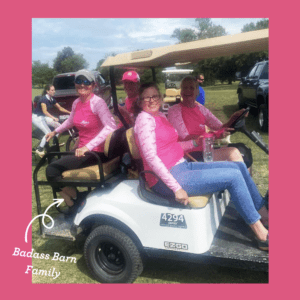
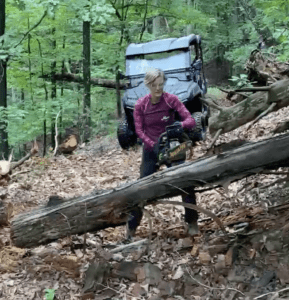
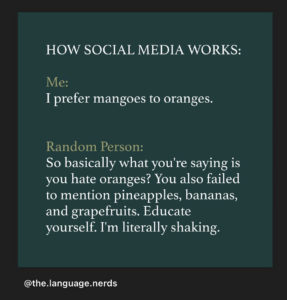
 Recently I’ve been sharing more about myself and the things I care about on my social media and in my newsletters. I understand that it’s always a risk to stand for something as a business because many people might prefer that business owners keep their thoughts to themselves. They’d prefer you just sell cute, useful things and keep it moving. But having a business also gives me a platform. And I want to use this platform for sharing things that I care about because they matter not just to me, but to other people, too. At the end of the day, I’m never going to make everyone happy, and that’s okay. I know some of you passionately agree with me on some things and some of you passionately disagree with me on others. But it’s important to me that I show up as my full self. Spoiler alert: I’m a complicated human.
Recently I’ve been sharing more about myself and the things I care about on my social media and in my newsletters. I understand that it’s always a risk to stand for something as a business because many people might prefer that business owners keep their thoughts to themselves. They’d prefer you just sell cute, useful things and keep it moving. But having a business also gives me a platform. And I want to use this platform for sharing things that I care about because they matter not just to me, but to other people, too. At the end of the day, I’m never going to make everyone happy, and that’s okay. I know some of you passionately agree with me on some things and some of you passionately disagree with me on others. But it’s important to me that I show up as my full self. Spoiler alert: I’m a complicated human.